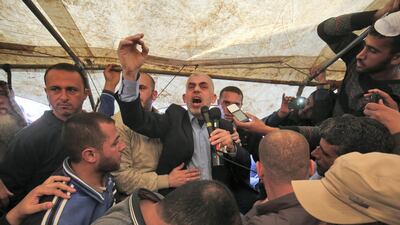Hamas's leader in Gaza underlined his desire for a ceasefire with Israel in excerpts of an interview that an Israeli newspaper published Thursday, stressing that he wishes to avoid a new war.
"A new war is not in the interest of anyone, certainly not in our interest," Yahya Sinwar was quoted by Yedioth Ahronoth as saying. "Who wants to fight with four slingshots against a nuclear power? Through war, you don't achieve anything."
But Mr Sinwar at the same time warned that if Israel's siege of Gaza is not lifted and the misery in the coastal enclave persists “an explosion is inevitable”. He was emphatic that removing the siege, which has crippled the Strip's economy, is a prerequisite for a ceasefire. Asked if he accepts a formula of "quiet in exchange for quiet" with Israel, he replied: “No. Quiet in exchange for quiet and the end of the siege. The siege is not quiet.”
The interview's full text is to be published in Yedioth Ahronoth and the Italian newspaper La Repubblica on Friday. It comes at a time of rising tensions between Israel and Hamas that threaten to further dampen prospects for a long-term ceasefire that third parties such as the UN envoy Nikolay Mladenov are seeking to broker. Mr Sinwar used the interview to communicate that the choice is a stark one: lifting the siege or another devastating war.
Nine Palestinians, including three teens, have been killed by Israeli snipers during protests at the Israel-Gaza border in the last week. The protests, in which 200 Palestinians have been killed since mid-March, have become more frequent recently and Hamas is calling for greater participation. In another sign of escalation, the Israeli army said yesterday it is bolstering its troop presence in the area.
The ceasefire talks already face the major obstacle of opposition by the West Bank-based Palestinian Authority President Mahmoud Abbas. There is also scepticism within Israel's ruling coalition, some of whose members argue that Hamas would just use a ceasefire to build up capabilities to attack Israel in the future.
Mr Sinwar put the blame for the deteriorating conditions in Gaza on Israel. "The responsibility belongs to the one who closed the borders, not the one trying to open them up. My responsibility is to cooperate with everyone who can help us end the siege. In the current situation, an explosion is inevitable."
________________
Read more:
Any US plan will mean tough choices for Abbas
Donald Trump trusted less than Vladimir Putin in global opinion survey
Israeli Prime Minister Benjamin Netanyahu addresses the UN
________________
Mr Sinwar's comments are consistent with those he made during a meeting with Gaza Strip political analysts and bloggers five weeks ago, according to Mkhaimar Abusada, a political scientist at Al Azhar University in Gaza City who was in attendance.
“He told us that Hamas does not want another war, that it will be devastating in terms of casualties and destruction. He was confident that a long term agreement [with Israel] is possible. But unfortunately, a week later things collapsed due to Abbas's veto,” Mr Abusada said.
“I can say that it is true he wants an agreement and no war. He wants to get out of the [disastrous] humanitarian situation,” he continued. “He wants a ceasefire, which could go for five years, and to get out of the humanitarian catastrophe.”
Mr Abusada said that Mr Sinwar told the commentators that “if Israel imposes war on Gaza, Hamas is ready to defend itself and the Palestinian people and will be ready to inflict pain on Israel.”
He said that if war erupts, Hamas will target Israel's Gush Dan region, which includes Tel Aviv and its environs. “Sirens will go off for six months,” he quoted Mr Sinwar as saying.
Menachem Klein, a specialist on Palestinian politics at Bar Ilan University near Tel Aviv, termed Mr Sinwar's remarks in the interview “sincere”.
“They want a ceasefire with Israel,” he said. “They know they can't conquer Israel. They want Israel to drop the siege and that there be no aggression against the Gaza Strip. They want a coexistence between two enemies.”
In a statement issued after Yedioth Ahronoth published the excerpts on its website, Mr Sinwar's office said that he had been misled by the journalist who interviewed him, Italian freelancer Francesca Borri, and that he did not know he was giving an interview to an Israeli outlet.
“She is not respecting her profession,” it said.
Ms Borri told The National that she had not acted improperly. “I told them of course this will be translated into Hebrew. I was transparent with them,” she said.

